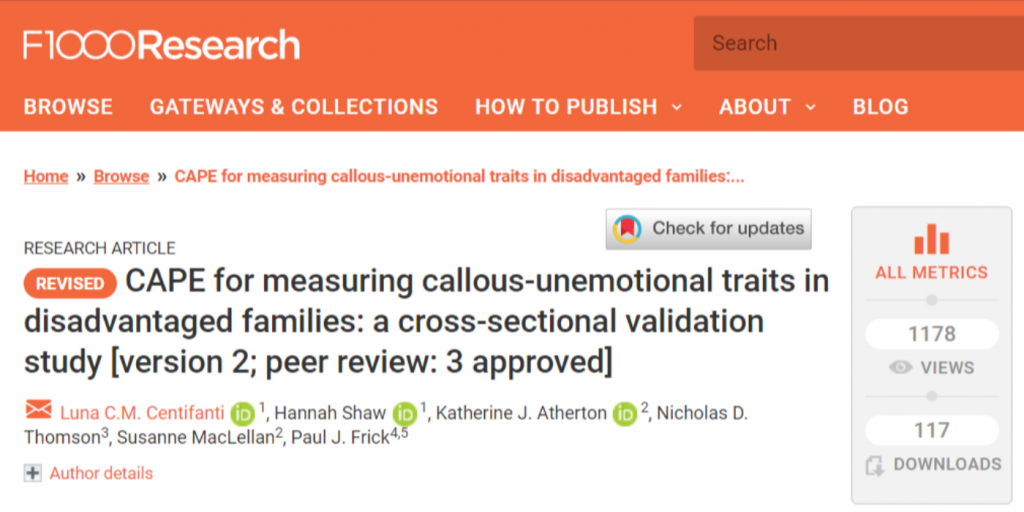Supporting real-world impact in the humanities and social sciences
| 13 October, 2021 | Gearóid Ó Faoleán |
|

|

As F1000Research extends its trailblazing open research publishing offering into all subject disciplines, F1000’s Gearóid Ó Faoleán gives us an inside look at what this means for researchers in the humanities and social sciences (HSS).
For those who might not be familiar, F1000Research is an open research publishing platform. Not only is the research we publish open access, but also peer review takes place openly and all the underlying data associated with the research is publicly available.
At present, open research has found its largest audience among life science researchers, where data sharing has long been the norm. However, the benefits of open research are also enormously beneficial to researchers in the humanities and the social sciences (HSS). Just some benefits to consider include:
- Increased speed of publication
- Increased visibility and discoverability of research
- Transparent and constructive peer review
- Quantitative and qualitative data sharing
- Free and unlimited access to emerging research
Much of the research in HSS has the potential to make a real world impact. At F1000, we believe it’s essential for that research to be made available as widely and as quickly as possible.
F1000Research: a new home for HSS research
When HSS researchers publish on F1000Research, their research can be accessed quickly and without barriers by scholars, practitioners, policymakers, and the public. Articles receive a DOI and are visible and citable in as few as 14 days after submission. As peer review begins following the initial publication, reviewers focus on objective improvements to the research rather than gauging its novelty.
In addition, we offer a range of alternative article types for publication that the traditional publishing model ignores. Typically, at the end of a research project, several long-form articles will be published and much of the rest of a project’s ‘gray literature’ never see the light of day. These other valuable research outputs, such as the methodology of the study, policy briefs, and data used for analysis, are not published. F1000Research encourages the publication of all these research outputs and more, ensuring increased impact of research projects and due credit to the authors.
Increasing publication turnaround, maintaining quality
The speed of publication at F1000Research may lead some to believe that quality is being sacrificed. This could not be further from the truth. The open research model is about publishing research quickly, but only after rigorous in-house editorial checks and ahead of expert peer review.
In some fields, including the humanities and social sciences, lengthy peer review means articles can spend 12+ months in an editorial system before the public has access to it. These delays to the publication of important research affect not only the scholarly community but also society as a whole. In comparison, the F1000Research open peer review model prioritizes both speed and quality. Once an article passes our in-house editorial checks, it is published on the platform and clearly signposted as ‘awaiting peer review’. An article’s peer review status changes accordingly as experts review the research. Here’s one example of an article that has passed peer review:

More data than you might think
Another misconception lies in the concept of data for the humanities and social sciences. The term data is not always used in these fields, leading some researchers to think that they do not utilize data in their research. Any material underlying a study’s findings is data, from surveys to interview transcripts, archival documents, audiovisual recordings of performance art, journalistic images, and more. The list of possible HSS data is almost limitless. It’s important that this material, this data, is widely shared to enable other researchers to build on the work of colleagues. Moreover, it ensures that authors receive full credit for their labors.
Building trust in HSS research
Much has been made of public trust and distrust in science in recent years, but what about the humanities and social sciences? Open research lends itself to achieving authority and trust. When research, research data, and peer review reports are published openly, readers can judge the fairness and the rigor of the research and review process for themselves.
Similarly, this increased transparency enables reproducibility and removes questions of unreliability from the scholarly debate. In addition, because we do not reject articles for novelty or impact, readers can be assured that authors are not sensationalizing or exaggerating the results of their research to catch an editor’s eye and guarantee publication.
Upcoming Collections and Gateways for HSS researchers
This month, we will be launching ‘Human Resilience, Growth, and Well-Being During COVID-19’, a special Collection on psychological resilience and the pandemic. Additionally, we will launch a new Gateway entitled ‘Human Migration Research’. This Gateway will provide researchers, policymakers, and practitioners with a space to disseminate work related to all areas of human migration. It will welcome article submissions from a broad range of sub-topics and interdisciplinary areas such as integration, ethnicity and identity, discrimination and nationalism, health, justice and policy, refugee status, and historical migration.
Finally, we will be launching four additional Gateways later this year in the areas of developmental psychology, the socioeconomic determinants of health, science communication, and addiction research.
There are more opportunities on the way for HSS researchers looking to publish on an interdisciplinary publishing platform with speed and quality at its center. To stay up to date with our latest news and calls for papers, follow us on Twitter or sign up for our newsletter.

|



User comments must be in English, comprehensible and relevant to the post under discussion. We reserve the right to remove any comments that we consider to be inappropriate, offensive or otherwise in breach of the User Comment Terms and Conditions. Commenters must not use a comment for personal attacks.
Click here to post comment and indicate that you accept the Commenting Terms and Conditions.